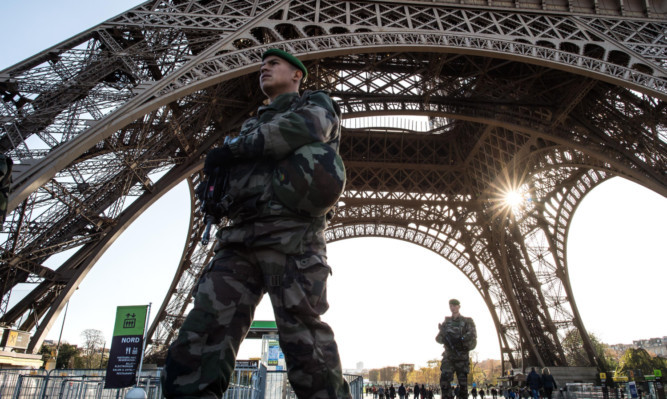On Friday 13th at 9.50pm the music stopped at the Bataclan theatre as French citizens died all over Paris. In a climax of a series of attacks aimed at the very heart of the city which exemplifies joie de vivre, the terrorists have made their bloody statement of death. Now there shall be the response.
A turning point has been reached,a new policy will be set. The question is in which direction shall things move. The early signs are not entirely encouraging.
In the aftermath of the atrocity, President Hollande declared that “war” had been declared on the French Republic with the clear implication that the main French response would be military. Gone was the previous line that these attacks were basically the work of ruthless fanatics and criminals who require to be brought to justice.
Instead it is accepted that Daesh is now at war with France and the Paris attack is the latest front of battle in a week which has also seen devastating attacks in Beirut, Baghdad and against Russian tourists in the Sinai. This initial reaction may be perfectly understandable, however it is one which will not disappoint the terrorists.
What Daesh has craved more than anything else is to be recognised as a state and a state at war with the Western world. That is after all why they call themselves the “Islamic State” and why they so hate the alternative description of them as Daesh, an Arabic acronym which mocks their pretensions of creating a new caliphate across the Levant.
However, the reality is that Daesh are not a state; they have no legitimacy, their only legal code is barbarity and their only currency is that of terror and murder. Nor are they much cop at fighting where people shoot back. On the ground in Iraq and in Syria they are now in headlong retreat.
Thus the Iranian-backed Hezbollah militia, operating under Russian air cover, have Daesh on the defensive in Syria while the Kurdish forces, coordinating with the Americans, are now in position over Highway 47, between the Daesh strongholds of Raqqa in Syria and Mosul in Iraq. The claimed new caliphate has effectively been cut in half.
These military successes also illustrate a fundamental tactical truth: bombing campaigns are only effective when backed by effective ground forces.
Thus the new fronts opened up by Daesh in the last few weeks against the “soft targets” of civilian populations across the Middle East, in France and against Russian civilian aircraft are not a sign of strength but of weakness. It will be a step forward to deprive the terrorists of their geographical centre of operations. However, to believe that the military defeat of Daesh would in itself end the terrorist threat is to seriously misunderstand the true nature of our enemy.
Philip of Macedon once said that ancient Athens was not a city, not a state but an idea. Thus, despite Daesh pretensions to statehood, Islamic terrorism is not a country but a cause. A convoluted, twisted cause certainly, but a cause nonetheless.
The moving displays of solidarity around the world with the French people in the aftermath of the Paris attacks actually place France in roughly the same position that the United States found itself in after 911.
At that moment of supreme extremity in 2001 America had never been stronger or carried more international support. The day after the Twin Towers came down, even the PLO were expressing solidarity with the United States. Now France also carries the moral strength of having suffered such pain. The question is will they use that credibility in a positive manner or will they dissipate their position of authority as George W Bush so tragically did in the quagmire of Afghanistan and Iraq and on his own particular “war on terror”.
Therefore to where should France turn in its moment of trial? Firstly, to the French people. Defiantly determined to continue with their way of life, Paris shall not be cowed. Much has been said of the fractured divisions of French society. Not enough about the fundamental traditions of liberty, equality and fraternity on which the Republic was founded.
Secondly, they should look first to Vienna rather than Syria for real solutions. Unlike the UK, France is already heavily involved in the Syrian civil war. However, on Saturday in Vienna, even as the bombs and bullets still echoed in Paris, the multinational talks on ending the Syrian conflict made far more progress than expected. France needs to lead the absolute and urgent necessity of reaching international agreement to halt this ruinous five-year old civil war.
Thirdly, France now has a key role in breaking the cycle of violence in which we are now locked. The French have a long history of creative diplomacy. They understand the importance of starving Daesh of oil funding and also of the shameful financial support which is fuelling the sinews of their terror.
“La gloire” for France lies in being seen as a leading peacemaker in the Middle East, a leading donor to financial reconstruction in the region, and a leading recipient to help those who see Europe as a sanctuary.
A war on conflict, a war on want and a war on man’s inhumanity to man. Now that would be a war worth having and, for the nation of France right now, one well worth leading.
